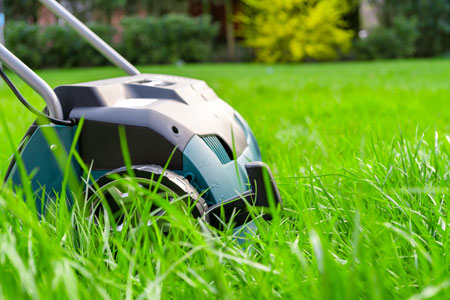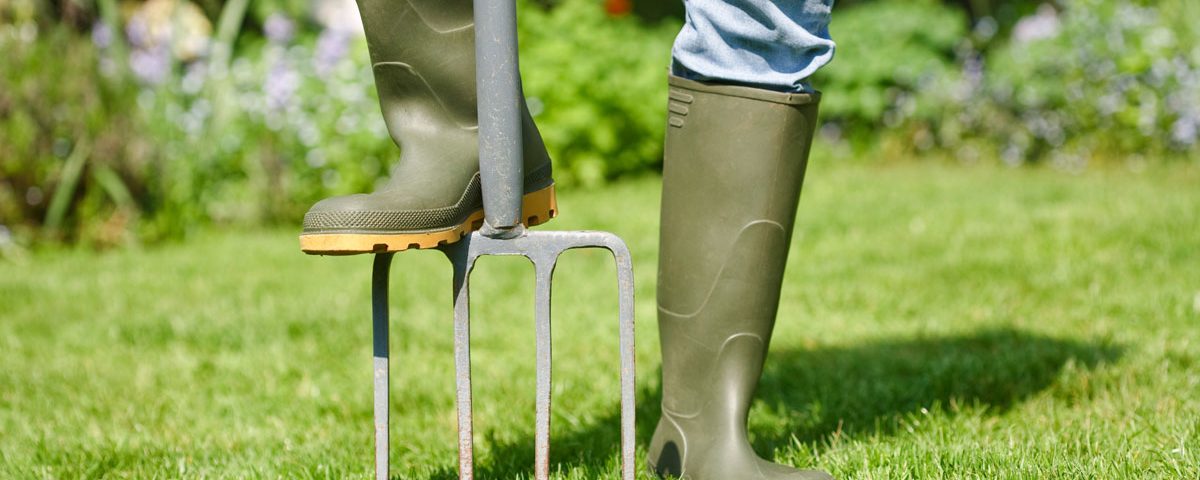
Our Clients:

The Benefits of Aerating Your Lawn

Fall Lawn Care Tips: A Vital Time of Year
November 7, 2019
Sod, Seed, or Hydroseeding: Which Option Is Best For Your Lawn?
February 3, 2020Lawn Care Maintenance
Regular maintenance and lawn care can go a long way to help you achieve a beautiful lawn. Interestingly, the notion of lawn care dates as far back as the 12th and 13th centuries. A Japanese book on gardening mentions the use of sod and turf grass lawns in 1159, and in the 1200s, turfgrass was used for some of the first sports lawns and fields.
If landowners were able to maintain a manicured lawn back then, it should be no problem for modern homeowners to do the same. However, maintaining a lush green lawn is not as simple as watering it regularly. To truly achieve a healthy lawn, things like proper mowing, fertilization, and aeration are also important. Aeration is often overlooked but is a fundamental component when it comes to achieving a healthy lawn.
What is Lawn Aeration?
Aeration is the process of perforating the ground and soil with small holes. Opening up the dirt like this allows vital nutrients, air, and water to penetrate the grassroots better. This helps the grassroots to grow deeper, which in turn produces a stronger, healthier, and more robust lawn.
Why You Should Aerate Your Lawn
Like most plants and things in nature, grassroots need water, air, and nutrients to survive and grow strong. If the soil becomes compacted, it hinders the growth of grassroots by obstructing vital elements and nutrients from entering the ground. When deprived of these basic needs, grass will struggle to grow and can eventually thin and die out.
Thatch is another issue that can inhibit grass growth. Thatch consists of organic debris such as shoots, stems, and roots, that build-up at the surface of the lawn. Typically, these things are beneficial to the health of the lawn, but too much of it can deter growth. Just like compacted soil, an overgrowth of thatch blocks essential nutrients from reaching the grassroots. Aerating your lawn will help with thatch and compaction, but if there is too much thatch, you may need to dethatch your yard fully.
What Causes a Compacted Lawn?
Soil compaction happens when soil particles are pressed tightly together, which reduces the pore space between them. Soil can become compacted from heavy foot traffic, dogs or other animals running in the yard, or from heavy equipment or cars being wheeled onto the grass. Heavy rainfall and wet weather can also contribute to soil compaction. Wet soil gets compacted easier than dry soil.
Signs Your Yard Needs to be Aerated
There are a few things you can look for to determine if the soil is compacted in your yard:
- Puddles of water in low areas of the lawn or water running quickly away from the lawn during heavy rainfall.
- Thin or patchy grass.
- There are bare dirt areas where nothing is growing.
- Shallow tree roots.
- Hard soil that is difficult to shovel.
- The grass is turning brown or looks dehydrated.
Should You Be Aerating Your Lawn?
If you still aren’t sure if your soil is compacted, there are a few additional factors that can help you determine if you need to aerate your lawn:
- Was your home recently built? The topsoil of newly constructed lawns often gets compacted from heavy foot and construction traffic.
- If you have a lot of children in the neighborhood or pets that run around your lawn, it can become compacted.
- If you recently had new sod or turf laid down. Soil layering from new sod can disrupt water drainage.
- Your grass dries out quickly and has a spongy feel to it, which is a sign of excessive thatch.
What Time of Year is Best for Aeration?
You should aerate your lawn during seasons that support its recovery and growth. This means aerating during the growing seasons, which can vary depending on the type of grass and region. Cool-season grasses that are common in Western Washington lawns thrive during cooler temperatures. The best time of year for aeration of these lawns is in the spring and fall.
If your lawn gets compacted easily or if you have trouble with hatch, you may need to aerate more often, or at least annually. However, if your yard is healthy and grows well, aerating every 2 to 3 years is sufficient. Just be careful and pay attention to how your lawn is reacting, as aerating too often can damage your grass.
Tools to Use for Lawn Aeration
There are two main types of lawn aerators most commonly used:
- Spike aerators or slice aerators poke holes into the ground with a tine or a drum that rolls across the lawn.
- Plug aerators have hollow cylinders that remove plugs of grass and soil from the lawn. The size of the holes they create will vary depending on the machine used.
If your lawn is only slightly compacted, a spike aerator will work fine. However, if your yard is prone to thatch and compaction, it is recommended that you use a plug aerator.
How to Aerate Your Lawn
You could always hire a professional to maintain and aerate your lawn for you if you don’t want to handle the task yourself. If you think you can manage it on your own, the tips below will help you get started:
- Before starting, make sure the soil is moist. Dry soil is sometimes harder to pierce. Aerating before it rains is often best. If it hasn’t rained in a while, you can water your lawn a day or two ahead of time in preparation.
- Make multiple passes. Most aerators only cover a small area as they pass.
- Leave the plugs left behind to break down or let them dry out and then break them down yourself with a rake or by running a mower over the lawn.
- After aerating, you should continue to care for your lawn with regular mowing, watering, and fertilizing.
Country Green Turf Farms
Country Green Turf Farms provides the highest quality turfgrass products in Redmond, WA. Along with growing our own sod, we also offer a variety of services, including hydroseeding. Turfgrass seed, fertilizer, lime, and other lawn supplies are available in our stores. For expert advice on aerating your lawn, call Country Green Turf Farms today!










